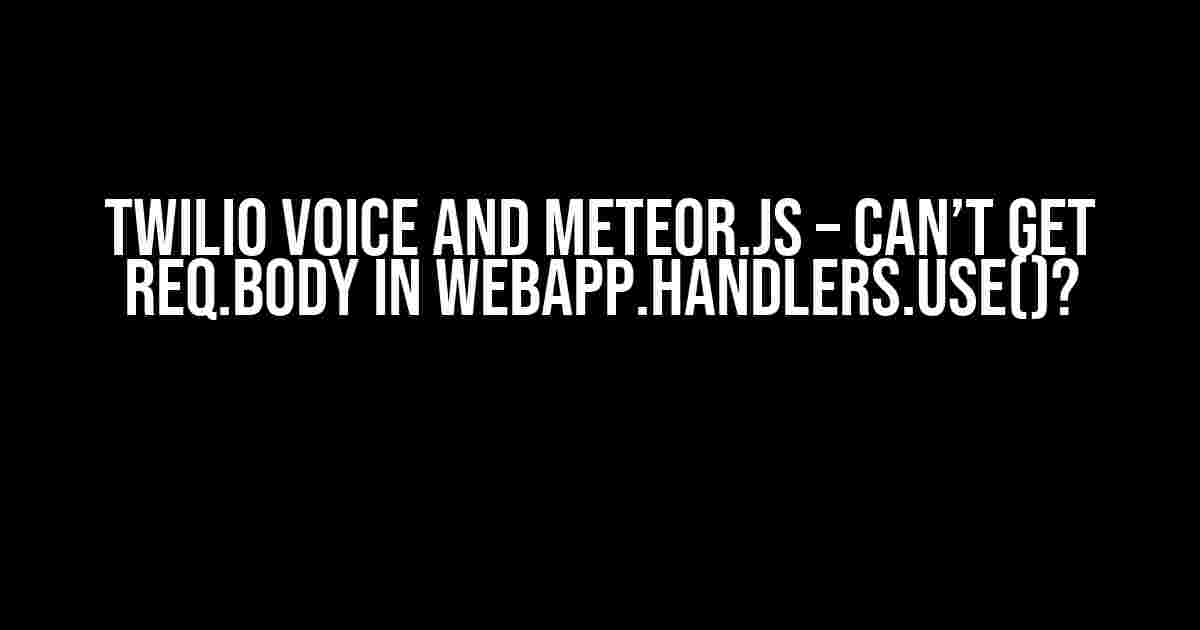Are you stuck trying to integrate Twilio Voice with Meteor.js, only to find that req.body is mysteriously missing in WebApp.handlers.use()? You’re not alone! In this article, we’ll dive into the world of Twilio Voice and Meteor.js, exploring the reasons behind this frustrating phenomenon and provide a clear, step-by-step guide to help you overcome this hurdle.
Understanding the Problem
When building a voice-enabled application with Twilio and Meteor.js, you might encounter an issue where req.body is empty or undefined in the WebApp.handlers.use() middleware. This can be particularly frustrating when trying to access Twilio’s request data, such as the caller’s phone number or the call’s status.
The Culprit: Meteor’s Built-in Middleware
The root of the problem lies in Meteor’s built-in middleware, specifically the connect-json middleware. This middleware is enabled by default and is responsible for parsing JSON requests. However, it also has the side effect of consuming the request body, making it unavailable in subsequent middleware functions.
// The connect-json middleware is enabled by default in Meteor
Meteor.startup(function() {
WebApp.connectHandlers.use('/api/voice', function(req, res, next) {
console.log(req.body); // undefined
next();
});
});
Solution 1: Disabling the connect-json Middleware
One way to overcome this issue is to disable the connect-json middleware altogether. This can be done by adding the following code to your Meteor application:
WebApp.connectHandlers.use('/api/voice', WebApp.rawConnectHandlers);
By using WebApp.rawConnectHandlers, you’re telling Meteor to bypass the built-in middleware and provide direct access to the raw request object. This will allow you to access req.body as expected.
Solution 2: Using a Custom Middleware
A more elegant solution is to create a custom middleware function that parses the request body before passing it to your Twilio Voice handlers. This approach allows you to maintain the benefits of Meteor’s built-in middleware while still accessing req.body.
// Create a custom middleware function
function parseRequestBody(req, res, next) {
if (req.method === 'POST' && req.header('Content-Type') === 'application/x-www-form-urlencoded') {
req.body = qs.parse(req._buffer);
}
next();
}
// Use the custom middleware in your Twilio Voice handlers
Meteor.startup(function() {
WebApp.connectHandlers.use('/api/voice', parseRequestBody);
WebApp.connectHandlers.use('/api/voice', function(req, res, next) {
console.log(req.body); // Now accessible!
next();
});
});
Solution 3: Using Twilio’s Request Object
Another approach is to utilize Twilio’s built-in request object, which contains the necessary data for processing voice requests. This eliminates the need to access req.body altogether.
Meteor.startup(function() {
WebApp.connectHandlers.use('/api/voice', function(req, res, next) {
const twilioReq = new Twilio.Request();
console.log(twilioReq CALLER_NUMBER); // Access Twilio's request data
next();
});
});
Conclusion
Integrating Twilio Voice with Meteor.js can be a powerful combination for building voice-enabled applications. However, the missing req.body in WebApp.handlers.use() can be a stumbling block. By understanding the root cause of the issue and implementing one of the solutions outlined above, you’ll be able to overcome this hurdle and unlock the full potential of Twilio Voice and Meteor.js.
Troubleshooting Tips
If you’re still experiencing issues with req.body, consider the following troubleshooting tips:
- Verify that the request is being sent as application/x-www-form-urlencoded.
- Check the request headers to ensure that the Content-Type is correctly set.
- Use the Chrome DevTools or another debugging tool to inspect the request and response data.
- Confirm that the custom middleware or Twilio’s request object is being used correctly.
Additional Resources
For further information on integrating Twilio Voice with Meteor.js, refer to the following resources:
By following the steps outlined in this article, you’ll be well on your way to building a voice-enabled application with Twilio and Meteor.js. Remember to stay calm, be patient, and don’t hesitate to seek help if you encounter any further issues.
| Keyword | Definition |
|---|---|
| Twilio Voice | A cloud communication platform for building voice-enabled applications. |
| Meteor.js | A JavaScript framework for building real-time web and mobile applications. |
| req.body | The request body, which contains the data sent with the HTTP request. |
| WebApp.handlers.use() | A Meteor middleware function for handling HTTP requests. |
Happy coding!
Frequently Asked Questions
Get clarity on Twilio Voice and Meteor.js integration with these frequently asked questions!
Why can’t I access req.body in WebApp.handlers.use() when integrating Twilio Voice with Meteor.js?
This is because Meteor.js uses a Fiber to handle requests, and the Fiber is not aware of the `req` object. To access the request body, you can use the `this.request.body` syntax within the `WebApp.handlers.use()` middleware.
How do I configure Twilio Voice to work with Meteor.js?
You’ll need to set up a Twilio account, create a Twilio phone number, and configure the Twilio Voice SDK in your Meteor.js project. You can use the `twilio` package in Meteor.js to interact with the Twilio API.
What is the difference between a Twilio Voice call and a standard HTTP request in Meteor.js?
A Twilio Voice call is a WebRTC (Web Real-Time Communication) request that establishes a real-time communication channel between the client and the server. In contrast, a standard HTTP request in Meteor.js is a stateless request that is handled by the server and responds with a HTTP response.
How do I handle Twilio Voice call events in Meteor.js?
You can use the `twilio` package in Meteor.js to handle Twilio Voice call events, such as `call iniciated`, `call ringing`, `call answered`, and `call ended`. You can also use Meteor.js methods and publications to broadcast call events to connected clients.
Can I use Meteor.js templates to render Twilio Voice call interfaces?
Yes, you can use Meteor.js templates to render Twilio Voice call interfaces. You can create a template that displays the call interface and use Meteor.js helpers to bind call data to the template.

